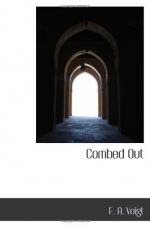The shells burst over and beyond the belt of trees in front of us. Vivid, multicoloured scintillations and innumerable glittering stars flashed out and thronged the sky. At times the shells fell so thickly that a white flame of dazzling brilliancy would dart writhing along the tree-tops with lightning speed. The booming of the guns and the terrible screeching of the shells continued unabated. We were blinded, deafened, and all our senses were confused.
At last the tumult began to die down. I looked round, curious to see the effect on the other men. Frequent flashes still lit up every detail of our surroundings.
Everyone had stopped working. Most of us were gazing ahead, thoroughly scared. Standing next to me was someone who said he had always wanted to see a bombardment and now he was satisfied. He was not at all frightened, being one of the few who realized that we had been in no danger. By the light of the gun-flashes I saw, a few yards in front of me, one of our men, a young nervous fellow, stretched out at full length, trembling, and sobbing hysterically and clutching at the grass with hands that opened and closed in mad spasms. Another man was cowering down by one of the trucks, his face buried in his arms.
Our Sergeant approached. He was quite unafraid and had a rather bored look on his face. Two men were walking beside him. One of them, a Corporal, who a few hours before had complained that we were having no excitement, was saying in a strained, halting voice, that he felt very unwell, that he had hurt his knee, and would like to go back to camp. The other, a small, broad-shouldered, full-chested, squat individual, with a flat nose and a brutal face—the champion light-weight boxer of our unit—implored the Sergeant in whining tones to let him go home. The Sergeant, however, told him to shut up and go on with his work.
Gradually the firing became less and less frequent, until finally it died down altogether. Soon the big yellow disc of the moon rose above the tree-tops and all was silent except for the croaking of the frogs.
We finished emptying the trucks and then sat down inside them. The engine came along, rattling and puffing. It was coupled to the train, and the return journey began.
The landscape was plainly visible in the light of the rising moon. Shell-holes, torn trees, and ruined houses decreased in number. We passed a straw-thatched cottage nestling amid a group of bushes and poplars. A light shone from the window, a dog barked. A bat flitted silently past. It seemed as though the uproar of the cannonade had been a dream.
The engine stopped at the siding. We jumped out of the trucks and retired into our tents. Not a word was spoken by anyone.
The following day we again received orders to proceed to the terminal siding by the light railway.
In the morning our champion boxer had reported sick in anticipation. He looked convincingly pale and complained of the usual “pains all over.” The Medical Officer gave him “light duty” and he spent the day in camp, picking up matches, bits of paper, and miscellaneous rubbish.




